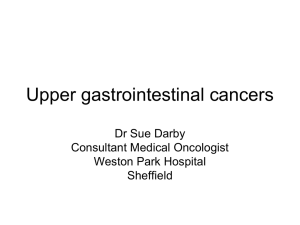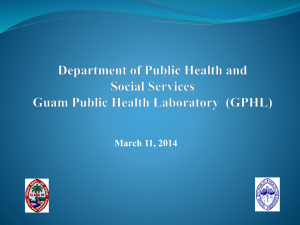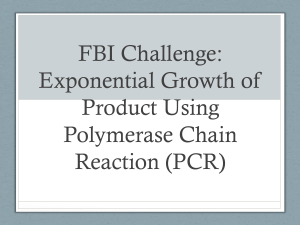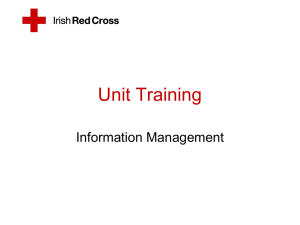Neoadjuvant Therapy - Scientific Organizing Service
advertisement
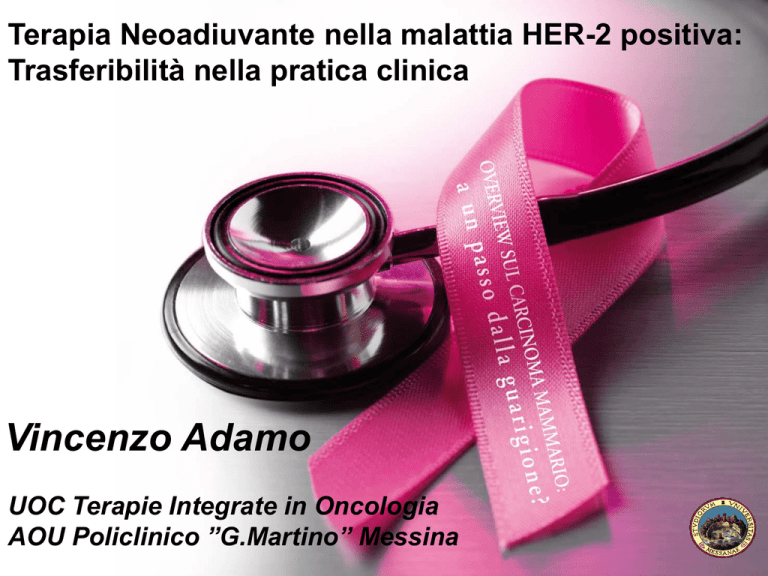
Terapia Neoadiuvante nella malattia HER-2 positiva: Trasferibilità nella pratica clinica Vincenzo Adamo UOC Terapie Integrate in Oncologia AOU Policlinico ”G.Martino” Messina Sequence of Treatment for Primary Breast Cancer Diagnosis and Staging Diagnosis and Staging Surgical Resection Neoadjuvant systemic therapy Adjuvant systemic treatment Surgical Resection Adjuvant therapy The Rational for Neoadjuvant Therapy in Breast Cancer: Which Patients? Traditionally: Neoadjuvant systemic therapy should be considered for patients inoperable at onset: T4, clinical N2-N3 New data: supporting preoperative or neoadjuvant systemic therapy in primary operable breast cancer patients NCCN Guidelines 2011:neoadjuvant chemotherapy or trastuzumab plus chemotherapy should be considered for HER2+ patients Goals of Neoadjuvant Theapy in Breast Cancer Make tumours more operable, increase the rate of breast conserving surgeries Improve prognosis of certain disease subtypes (i.e. HER2+) Have a better idea of prognosis based on response to neoadjuvant treatment Allow patients to start treatment earlier Reduce the extent of surgery required in breast and axylla Improve DFS and OS using pathological response rate for selection of subsequent treatment in individual patients Parametres to assessed in clinical practice pCR and Treatment Outcomes Status lymph node (sentinel node biopsy) Instrumental evaluation with MRI and PET Toxicity Definition of pCR Different definition of pCR are in use: - Absence of invasive cancer in the breast - Absence of invasive cancer in the breast and in the axillary lymph nodes. - Absence of invasive and in situ cancer cells in the breast and in the axillary nodes There is high degree of concordance between the different definition With very definition pCR identifies cases with favorable disease Marchiò C. & Sapino A. JNCI Monogr 2011;43:86–90 Putative Predictive Factors of pCR Tumor size & Tumor grade Histological type ER/PgR Her2/neu Proliferative markers ( Ki-67/MIB-1, PCNA) Treatment & MDR-1/pgp pCR to Neoadjuvant Chemotherapy is correlated with improved DFS & OS (NSABP B-27) Disease free-survival Overall Survival There was no significant difference in overall survival (OS) between the treatment arms (data not shown). Pathologic CR (pCR) was a significant predictor of OS, regardless of treatment. Bear HD, et al. J ClinOncol. 2006;24(13):2019-2027. Outcomes of Neoadjuvant Trials with unselected tumor characteristics Mazouni C, et al. J Clin Oncol. 2007 Intrinsic sub-types have different prognosis and different response to NACT MD Anderson Neoadjuvant Trial DFS at 72 months FU Budzar A. et al Asco 2009 “ ..if indicated, the majority of the Panel considered that the neoadjuvant chemotherapy regimen should include both a taxane and an anthracycline and(for HER2-positive disease) an anti-HER2 drug. Thus, the choice of a regimen for adjuvant or neoadjuvant chemotherapy might be made using similar criteria..’’ Goldhirsch A, et al. Ann Oncol. 2009;20(8):1319-1329. Impact of treatment characteristics on the pCR Untch M. et al J Nat Cancer Inst Monogr 2011. Impact of treatment characteristics on the pCR Untch M. et al J Nat Cancer Inst Monogr 2011. Schedules and pCR rate in HER2-positive disease V, vinorelbine; X, capecitabine; C, carboplatin ; FEC, 5-fluorouracil, epirubicin, cyclophosphamide. Pre and Post-operative Chemotherapy plus Trastuzumab Improve DSF … Future Clinical Practice…. Anti-HER2 Treatment: Mechanisms of action Three Neoadjuvant Trials Using Targeted Therapies for HER-2 Positive BC pCRS in Three Trials with Target Therapies Guarneri V. et al. ASCO 2011 Efficacy: Breast and Axillary pCR Rate Guarneri V. et al. ASCO 2011 Status lymph node (sentinel node biopsy) SLNB in relation to neoadjuvant therapy Which is the aim of SLNB in breast cancer patients? Which patients are usually receiving neoadjuvant? Is there a role of SLNB in patients undergoing neoadjuvant therapy? Should SLNB be performed before or after neoadjuvant therapy? Are there sufficient data supporting either approach ? St Gallen 2007, Annals of Oncol 18: 1133–1144, 2007 SLN Biopsy Prior to Therapy Disadvantages • Two operations • Potentially delays start of chemotherapy Advantages • Higher identification rate • Lower false negative rate St Gallen 2007, Annals of Oncol 18: 1133–1144, 2007 The Role of SNLB Inflammatory breast cancer not indicated – breast lymphedema, due to occluded lymphatics by metastatic cells inadequate lymphatic drainage mapping agents would also be trapped and not travel to the SLN false-negative rate very high Locally Advanced (large tumor size) - Palpable lymphadenopathy FNA –No Role for SNLB - Non palpable or Clinically negative LNs SLNB is acceptable - Before or after neo-adjuvant chemotherapy ? St Gallen 2007, Annals of Oncol 18: 1133–1144, 2007 Marchiò C. & Sapino A. JNCI Monogr 2011;43:86–90 St Gallen 2011: SN and ALND Downstaging Axilla & Complete Axillary Response Strong prognostic factor Axillary pCR: 93% Residual disease: 60% Hennessey BT, et al. J Clin Oncol.2005;23(36):9304-9311. Instrumental evaluation: MRI and PET and Neoadjuvant Chemo in HER2BC MRI: Evaluation Neoadjuvant Chemotherapy MRI highest accurracy for monitoring chemotherapy Change in (residual) tumor size, signal intensity, and contrast kinetics Underestimation possible! Mc Guire K.P. et al.Ann Surg Oncol 2011 MRI Staging after NACT : Does Tumor Biology Affect Accuracy? MRI response versus pathologic response by tumor subtype. Discrimination and predictive value (a) overall, (b) luminal A/B, and (c) HER2+/TN Mc Guire K.P. et al.Ann Surg Oncol 2011 Early metabolic response using PET in Neoadjuvant BC Keam B.et al.BMC Cancer 2011 Toxicity and neoadjuvant Chemotherapy in HER2BC LVEF during and after therapy LVEF HER2-positive trastuzumab HER2-positive control 80 80 60 60 40 40 20 20 Gianni L. et al Lancet 2010 LVEF change during and after therapy LVEF change (% units) HER2-positive trastuzumab HER2-positive control 30 30 20 20 10 10 0 0 -10 -10 -20 -20 -30 -30 Gianni L. et al Lancet 2010 Cardiac Toxicity & Trastuzumab Gianni L. et al Lancet 2010 Cardiac monitoring guidance: Trastuzumab • All patients for Herceptin treatment should undergo baseline cardiac assessment prior to treatment initiation • For patients with EBC, cardiac assessment should be performed every 3 months during treatment and at 6, 12 and 24 months following cessation of treatment • For patients with MBC, cardiac function should be monitored during treatment (eg every 3 months) • Patients who develop asymptomatic cardiac dysfunction may benefit from more frequent monitoring (eg every 6-8 weeks) CGCC, Cardiac Guidelines Consensus Committee; EMEA, European Medicines Evaluation Agency HER2 BC & Neoadjuvant St Gallen 2011 Intrinsic sub-types have different prognosis and different response to NACT Comments and questions Conclusive comments • NACT should be considered as an option for every woman as far as the indication for adjuvant treatment has been confirmed • Many good quality clinical trials suggest that trastuzumab should be incorporated in the preoperative treatment of women with HER2-pos (..NCCN guidelines). open questions • the preferred combination chemotherapy with trastuzumab • the optimal duration of trastuzumab in pts who achieve a pCR after preoperative chemotherapy. The end • Stop here NOAH Neoadjuvant Trial: pCR Rates Gianni L. et al. Lancet 2010 pCR After NACT Plus Trastuzumab Predicts Favorable Survival in HER2+ BC: Results From the TECHNO Untch M. et al, JCO 2011 Neoadjuvant Therapy (NAT): Potential Advantages Improved Tumor Downstaging Inoperable Operable Mastectomy BCS Provides in vivo assessment of anti-tumor effects Provides opportunity to assess surrogate biological endpoints Early initiation of systemic therapy Inhibition of post-surgical growth spurt May expedite new drug development no pCR and Treatment Outcome no pCR is a robust measure of therapeutic effects and surrogate a DFS in responder Increase pCR rate should correspond to improved efficacy in the overall patient population Prediction of pCR should predict for benefit and allow for tailoring treatment to indivudual tumor characteristics BC after NACT:The M.D. Anderson Cancer Center Experience no Chen AM et al. J Clin Oncol. 2004;22:2303-2312. Scenario for Neoadjuvant Therapy in HER2 Positive Breast Cancer no Trastuzumab in NACT – pCR no T-FEC T-FEC + H 26.3 % 66.7 % pCR ER pos 27 % 61 % pCR ER neg 25 % 70 % 78.9 % 90.3 % pCR pN0 Study closed after first 42 pts due to the strong advantage for H combination H stopped at the end of NACT (6 months) Buzdar AU et al, PASCO 2004 ; Clin Cancer Res 2007 Locally Advanced with non palpable or clinically negative LNs no St Gallen 2007, Annals of Oncology 18: 1133–1144, 2007 Sentinel Lymph Node Biopsy in BC patients Treated With NACT no Pecha V. et al. Cancer 2011 Valutare se utile per finire o simile Timing of SLNB Vedere il lavoro di Sapino e mettere lo schema interessante Hunt KK, et al. Ann Surg. 2009;250(4):558-566 PET and Neoadjuvant Chemotherapy …Open Question in Clinical Practice…? ?
